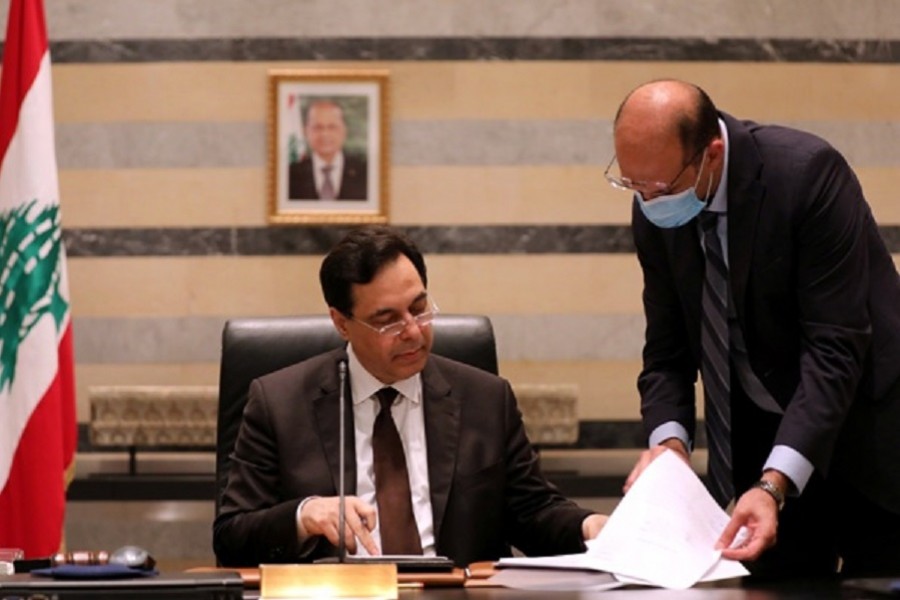Lebanon's prime minister was set on Monday to announce the resignation of his government, the health minister said, after a devastating explosion in Beirut that has stirred public outrage and spurred a string of ministers to step down.
The Aug. 4 port warehouse detonation of more than 2,000 tonnes of ammonium nitrate killed at least 163 people, injured over 6,000 and destroyed swathes of the bustling Mediterranean capital, compounding months of political and economic meltdown.
Demonstrations broke out again in central Beirut, with some protesters hurling rocks at security forces guarding an entrance leading to the parliament building, who responded with tear gas.
The cabinet, formed in January with the backing of the powerful Iranian-backed Hezbollah group and its allies, met on Monday, with many ministers wanting to resign, according to ministerial and political sources.
Health Minister Hamad Hasan told Reuters that Prime Minister Hassan Diab would soon announce the resignation of the entire cabinet. Diab, who said on Saturday he would request early parliamentary elections, was set to deliver an address to the nation at 7:30 p.m. local time (1630 GMT), his office said.
"The entire regime needs to change. It will make no difference if there is a new government," Joe Haddad, a Beirut engineer, told Reuters. "We need quick elections."
For many ordinary Lebanese, the explosion was the last straw in a protracted crisis over the collapse of the economy, endemic corruption, waste and dysfunctional governance, and they have taken to the streets demanding root-and-branch change.
The information and environment ministers quit on Sunday as well as several lawmakers, and the justice minister followed them out the door on Monday. Finance Minister Ghazi Wazni, a key negotiator with the IMF over a rescue plan to help Lebanon exit a financial crisis, was set to resign, a source close to him said.
Lebanon's president had previously said explosive material was stored unsafely for years at the port. He later said the investigation would consider whether the cause was external interference as well as negligence or an accident.
ACCOUNTABILITY
UN Secretary-General Antonio Guterres told a virtual briefing of UN member states on Monday that it was important that a "credible and transparent investigation determine the cause of the explosion and bring about the accountability demanded by the Lebanese people".
"It is also important that reforms be implemented so as to address the needs of the Lebanese people for the longer term,” he told the briefing on the humanitarian situation in Lebanon.
The Lebanese army said on Monday that another five bodies were pulled from the rubble, raising the death toll to 163. Search and rescue operations continued.
The cabinet decided to refer the investigation of the blast to the judicial council, the highest legal authority whose rulings cannot be appealed, a ministerial source and state news agency NNA said. The council usually handles top security cases.
Anti-government protests in the past two days have been the biggest since October, when angry demonstrations spread over an economic crisis rooted in pervasive graft, mismanagement and high-level unaccountability.
Lebanese, meanwhile, are struggling to come to terms with the scale of losses after the blast wrecked entire areas.
"The economy was already a disaster and now I have no way of making money again," said Eli Abi Hanna, whose house and car repair shop were destroyed. "It was easier to make money during the civil war. The politicians and the economic disaster have ruined everything."
Officials have estimated losses of around $15 billion from the explosion. Lebanon cannot afford that after having defaulted on debt exceeding 150% of economic output, and with talks stalled on a lifeline from the International Monetary Fund.
An international donor conference on Sunday raised pledges worth nearly 253 million euros ($298 million) for immediate humanitarian relief, but foreign countries are demanding transparency over how the aid is used.
Some Lebanese doubt change is possible in a country where sectarian politicians have dominated since the 1975-90 conflict.
"It won't work, it's just the same people. It's a mafia," said Antoinette Baaklini, an employee of an electricity company that was demolished in the blast.


